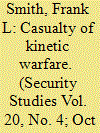| Srl | Item |
| 1 |
ID:
109074


|
|
|
|
|
| Publication |
2011.
|
| Summary/Abstract |
The US military is responsible for protecting its forces from biological weapons. However, the Department of Defense has neglected biodefense-most of the funding for which now comes from civilian organizations rather than traditional military sponsors. Why? I argue that organizational frames explain military neglect and the rise of civilian biodefense. Because the military's frame of reference is defined by kinetic warfare involving projectile weapons and explosives, it neglects non-kinetic capabilities like biodefense. In contrast, the civilian Department of Health and Human Services has a different organizational frame and thus is more amenable to supporting biodefense. I test this theory against realism and bureaucratic interests. I find that research, development, and acquisition for biodefense support the ideational theory of organizational frames, which has important implications regarding the influence of specific ideas on national security policy.
|
|
|
|
|
|
|
|
|
|
|
|
|
|
|
|
| 2 |
ID:
109872


|
|
|
|
|
| Publication |
2012.
|
| Summary/Abstract |
For more than fifty years, the World Health Organization has helped monitor flu viruses and manufacture vaccines through the Global Influenza Surveillance Network (GISN). However, GISN became a flashpoint for conflict when Indonesia refused to share its samples of avian influenza until drugs and other benefits were shared in return. Years of controversial negotiations were required to agree on a framework for virus and benefit sharing, providing important insights into disease surveillance, global norms, and international law. First, this controversy suggests that surveillance behaves like a luxury good, which complicates the conventional wisdom that it is a global public good. Second, even well-established norms were not immune to challenge, thereby limiting the significance of 'tipping points' and 'normative cascades'. Finally, legal arguments were common in this controversy but equivocal and inconclusive, so international law is unlikely to affect important outcomes relating to outbreak response.
|
|
|
|
|
|
|
|
|
|
|
|
|
|
|
|